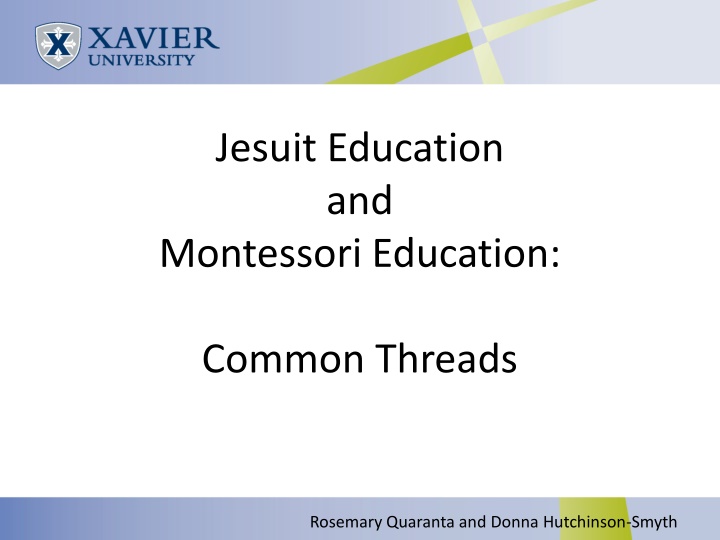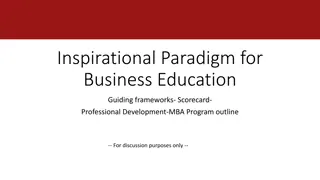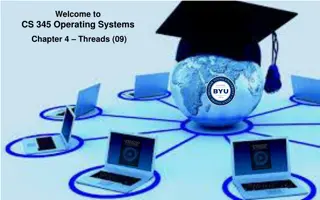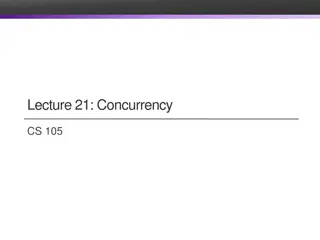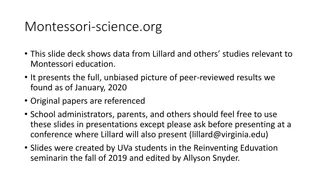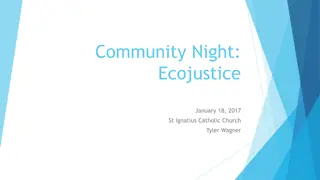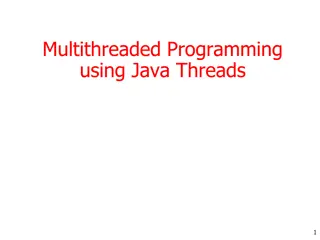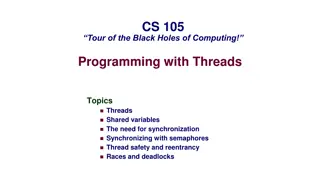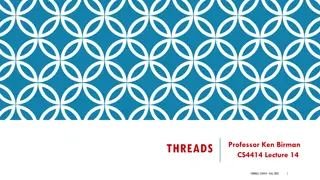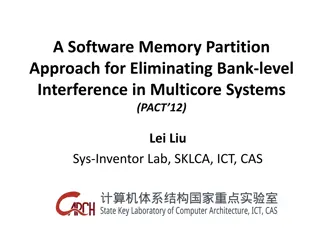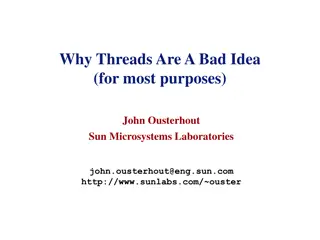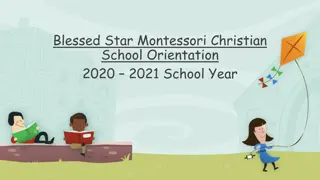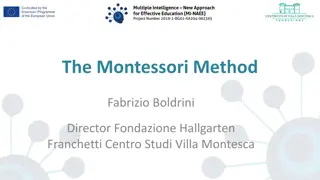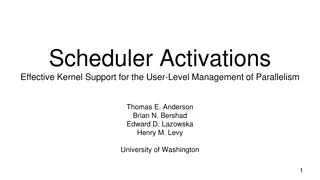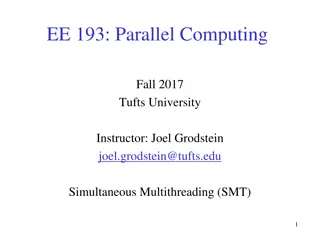Common Threads Between Jesuit Education and Montessori Education
There are common threads between Jesuit Education and Montessori Education, emphasizing nurturing the whole person, fostering respect and responsibility, and instilling a sense of wonder and gratitude. Both educational approaches aim to develop students as leaders in service, promoting holistic development and a deep sense of community. Integrating these philosophies can lead to a comprehensive and enriching educational experience for students.
Uploaded on Sep 23, 2024 | 0 Views
Download Presentation

Please find below an Image/Link to download the presentation.
The content on the website is provided AS IS for your information and personal use only. It may not be sold, licensed, or shared on other websites without obtaining consent from the author.If you encounter any issues during the download, it is possible that the publisher has removed the file from their server.
You are allowed to download the files provided on this website for personal or commercial use, subject to the condition that they are used lawfully. All files are the property of their respective owners.
The content on the website is provided AS IS for your information and personal use only. It may not be sold, licensed, or shared on other websites without obtaining consent from the author.
E N D
Presentation Transcript
Jesuit Education and Montessori Education: Common Threads Rosemary Quaranta and Donna Hutchinson-Smyth
Expanding XU Montessori Program to Jr. High School Integrates with XU Mission Statement Xavier is a Jesuit Catholic university rooted in the liberal arts tradition. Our mission is to educate each student intellectually, morally, and spiritually. We create learning opportunities through rigorous academic and professional programs integrated with co-curricular engagement. In an inclusive environment of open and free inquiry, we prepare students for a world that is increasingly diverse, complex and interdependent. Driven by our commitment to the common good and to the education of the whole person, the Xavier community challenges and supports students as they cultivate lives of reflection, compassion and informed action. A national and international reputation for excellence in Montessori education. High demand for an authentic Montessori Jr. High school (5 feeder schools in Cincinnati area) Will generate $120K in net revenue after year 3
Jesuit Education and Montessori Education: Common Threads Jesuit Vision Montessori Vision Sees life and the whole universe as a gift calling forth wonder and gratefulness Gives sample scope to imagination and emotion as well as intellect (education of the whole person) Sees to find the divine in all things, all people, all cultures Seeks freedom and responsible actions Empowers people to become leaders in service, "men and women (people) for/with others" To create an environment and curriculum that enhances and unfolds awe and wonder daily. To educate the whole child: physical, emotional, spiritual, cognitive and self development skills Models respect for all things, all people, all cultures, all life. Through freedom of guided choice students experience the power of teaching themselves and becoming responsible citizens of the future Embodies community and service for classroom, school, city, country and world through cosmic curriculum and deep community relationships. Rosemary Quaranta and Donna Hutchinson-Smyth
Jesuit Education and Montessori Education: Common Threads Jesuit Education Cura personalis Care of Person Attitude of respect for the dignity of each individual To nurture the whole self: mind, body, heart, soul. Using Spiritual Exercises to see the daily gifts given to us. Developing relationships with students that go beyond teaching Guiding students toward personal responsibility. Montessori Care of Person Attitude of respect for oneself and each other Teaching students to care for their daily needs Teaching students to care for their environment Developing a healthy community that nurtures each other as well as nurtures one self, the brain as well as the heart and spirit. To develop an awareness of personal responsibility and the impact it has on community Rosemary Quaranta and Donna Hutchinson-Smyth
Jesuit Education and Montessori Education: Common Threads Jesuit Education Discernment A process of making choices through being open to God s spirit in order to make good decisions that will contribute to the betterment of oneself and the greater good. What am I passionate about? How can I make a difference in the world? "Go Forth and Set the World on Fire" Montessori Education Making Choices In the Montessori classroom provide a supportive environment that allows for the development of making choices and the consequences of one s choices. What is one s cosmic task? What are my strengths? What are my challenges? How do I use my choices to enhance and contribute to the community. Rosemary Quaranta and Donna Hutchinson-Smyth
Jesuit Education and Montessori Education: Common Threads Jesuit Education Service Montessori Education Service Beginning with classroom community we develop a respectful understanding of each other and our community needs supporting each other in work and play. Working with the local community, the students begin to give back to local food shelters, Lydia s House, and North Avondale Community Center. Service Projects are an ongoing part of our Elementary curriculum. Upper Elementary will begin an afterschool program called YSL (Youth Service League) where students will volunteer to serve in many capacities: school, local community, city and world. Service Rooted in Justice and Love Educating Men and Women (people) for Others Service of Faith Promotion of Justice To develop a disciplined sensitivity toward the suffering of our world The will to act for the transformation of unjust social structures that cause that suffering. Rosemary Quaranta and Donna Hutchinson-Smyth
Jesuit Education and Montessori Education: Common Threads Jesuit Education Structure and Flexibility Montessori Education Structure with Individual Choice Supporting choice and independence creates an environment that allows for continued grown the development in a structured classroom setting. Students have a teacher for 3 years and this develops a rich understanding of who each student is. Meeting the individual needs of each child, enhancing their strengths and supporting their challenges. Going beyond the classroom setting to support individual students. Attending to individual needs of students Class size helps maintain a personal relationship with students. Working with students to support their strengths as well as their challenges. Going beyond the class to support the individual students. Rosemary Quaranta and Donna Hutchinson-Smyth
Jesuit Education and Montessori Education: Common Threads Jesuit Education Solidarity and Kinship Montessori Education Cooperation and Collaboration Awareness that only by working together can the human family meet effectively the challenges of worldwide hunger, ignorance, disease and violence. Extending of care to those close at hand. Commitment to change the economic, political and social structures that enslaves, dehumanize, and destroy human life and dignity. This is done through community service, service-learning projects and immersion experiences. To work together in a community of cooperation and collaboration of who each of us is and what we bring to the community. The experience of working together in a community setting, teaching and supporting each other through daily interactions and learning situations. To experience and participate as a school community in understanding the importance of changing the world in small simple ways through collection of food for food banks, working with families in the North Avondale and Norwood Community, supporting scholarship needs and imbedding the philosophy of giving back . Rosemary Quaranta and Donna Hutchinson-Smyth
Jesuit Education and Montessori Education: Common Threads Jesuit Education Reflection and Accountability Montessori Education Reflection/Transformation Daily reflection allows students to prioritize, understand, change, celebrate and improve oneself and there the community as a whole Asking questions instead of giving answers allows for the student to discover, experience, and investigate with a deeper understanding. Understanding one s strengths as well as one s challenges helps one celebrate strengths and work on challenges in a supportive community who accepts me for who I am. Socratic Discussion allows for understanding of others viewpoints and the ability to verbalize one s own. Reflection is a cornerstone to Ignatius s learning process. Thoughtful reconsideration of subject matter, experience, idea, purpose, or spontaneous reacting, in order to grasp its significance more fully. Achieving personal insights and coming to an understanding of who I am and who I might be in relation to others. Learning how to learn Ask questions to broaden students awareness and compel them to consider viewpoints others. Rosemary Quaranta and Donna Hutchinson-Smyth
Jesuit Education and Montessori Education: Common Threads Go Forth and Set the World on Fire Ignatius The great gift of education is not the accumulation of facts and statistics but the lighting of the fire of learning, discovery and joy. Maria Montessori Rosemary Quaranta and Donna Hutchinson-Smyth
Jesuit Education and Montessori Education: Common Threads Resources A Jesuit Education Reader by George W. Traub, S.J. Lighting the Way, Incorporating Jesuit Values as a Graduate Student Do You Speak Ignation? By George W. Traub, S.J. The Gifts of the Ignatian Heritage Flyer Rosemary Quaranta and Donna Hutchinson-Smyth
